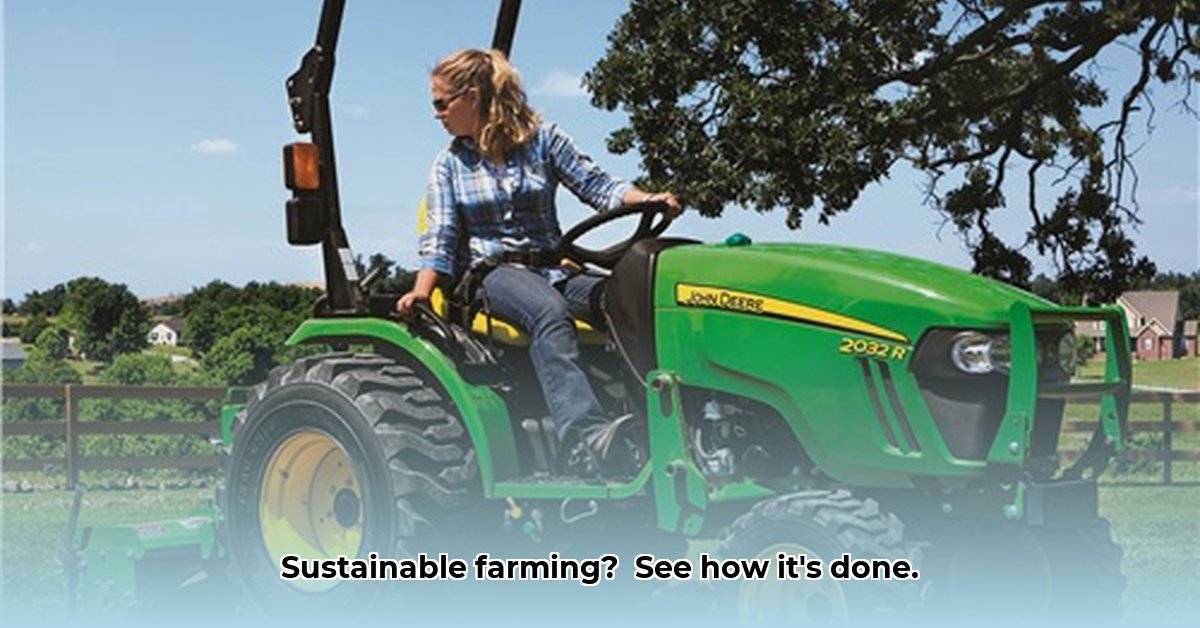
Heritage Tractor: A Lawrence Landmark Rebuilt for a Sustainable Future
Heritage Tractor, a fixture in the Lawrence, Kansas agricultural landscape, stands as more than just a John Deere equipment dealership. It's a testament to community resilience and a vital link in the chain of sustainable farming practices. The 2018 fire that devastated their facility was a significant blow, but the rebuilding process wasn't merely about restoring buildings; it signified a renewed commitment to serving local farmers and supporting environmentally conscious agricultural practices. The iconic John Deere mural, miraculously surviving the blaze, remains a powerful symbol of this enduring legacy. This story explores how Heritage Tractor, particularly through its "hot list" of discounted used equipment, is shaping the future of farming in Lawrence and beyond. For other agricultural supply needs, check out this nearby option.
How many farmers in this region rely on access to affordable, reliable equipment to maintain their operations? Heritage Tractor's success speaks volumes about the importance of this essential service. Their focus on John Deere equipment—a brand synonymous with quality and dependability—combined with their "hot list" of competitively priced used equipment offers a crucial lifeline to farmers operating on tight margins.
The "Hot List" and the Economics of Sustainable Farming
The "hot list" isn't just a marketing strategy; it's a practical solution to the economic challenges faced by many farmers. Sustainable agriculture, while essential for the long-term health of the planet, often requires significant upfront investments in specialized equipment and techniques. This can present a considerable hurdle for farmers already navigating fluctuating commodity prices and increasing input costs. By providing access to affordable, high-quality used equipment, Heritage Tractor is directly addressing this financial obstacle, allowing farmers to adopt sustainable practices without compromising their economic viability. This isn't just about selling tractors; it's about fostering the long-term health and prosperity of the farming community.
Unseen Sustainability: The Environmental Impact of Used Equipment
While quantifiable data on Heritage Tractor's specific sustainability initiatives may be limited, the environmental benefits of their used equipment program are undeniable. By extending the lifespan of existing machinery, Heritage Tractor significantly reduces the demand for new manufacturing, thereby lessening the environmental impact associated with production, transportation, and eventual disposal. This "circular economy" approach to equipment management contributes to a reduction in carbon emissions and resource consumption, a key aspect of responsible sustainability. "The extended use of equipment significantly diminishes the environmental burden associated with constant manufacturing and disposal," notes Dr. Emily Carter, Professor of Chemical and Biological Engineering, Princeton University. Moreover, supporting a local business like Heritage Tractor strengthens the economic resilience of the community, another critical component of sustainable rural development.
Collaborating for a Greener Future: A Path Forward
The potential for Heritage Tractor to actively promote and champion sustainability within the agricultural sector is substantial. A collaborative approach involving the dealership, local farmers, and supporting organizations is key to achieving this goal. This cooperative effort should focus on several key areas:
Enhanced Data Collection: Implementing robust data collection on the environmental impact of used equipment—such as reduced fuel consumption and emissions—would provide compelling evidence of the program's sustainability benefits. This data can be used to inform future efforts and strengthen communications.
Farmer Education and Empowerment: Offering workshops and training programs on precision agriculture, resource-efficient farming techniques, and other sustainable strategies empowers farmers with the knowledge and skills to optimize their practices while minimizing their environmental footprint.
Strategic Partnerships: Collaborating with government agencies and NGOs can unlock access to funding, cutting-edge technologies, and policy support that further promotes sustainable agriculture.
Imagine the cumulative environmental impact of numerous farmers choosing pre-owned equipment over new. This collective action represents a powerful, tangible commitment to environmental stewardship.
Key Takeaways:
- Affordable Access: Heritage Tractor's "hot list" of used equipment fosters access to crucial tools for sustainable farming.
- Environmental Stewardship: Extending the lifespan of existing equipment significantly reduces environmental impact.
- Community Resilience: Supporting local businesses like Heritage Tractor strengthens the economic health of the rural community.
- Collaborative Action: Partnerships between Heritage Tractor, farmers, and relevant organizations are essential for advancing sustainability initiatives.
https://heritagetractor.com/Used-Equipment?categories=Row+Crop+Tractors%7E